Scientists have compiled the largest and most detailed catalog yet of human genetic variation to help medical researchers find the genetic roots of rare and common diseases in populations worldwide. Credit: National Human Genome Research Institute
ST. LOUIS, Nov. 1 (UPI) -- Genomes of people whose homelands stretch from Africa and Asia to Europe and the Americas will help researchers find genetic roots of diseases, researchers say.
The genomes of more than 1,000 people have been sequenced and compiled to create the largest and most detailed catalog yet of human genetic variation, Washington University in St. Louis reported Wednesday.
The 1000 Genomes Project involved 200 scientists at the university's school of medicine and at other institutions.
"With this resource, researchers have a roadmap to search for the genetic origins of diseases in populations around the globe," said co-principal investigator Elaine Mardis of The Genome Institute at Washington University.
"We estimate that each person carries up to several hundred rare DNA variants that could potentially contribute to disease. Now, scientists can investigate how detrimental particular rare variants are in different ethnic groups."
Genetically any two people are more than 99 percent alike, researchers said, but rare variants -- occurring with a frequency of 1 percent or less in a population -- are thought to contribute to rare diseases as well as common conditions like cancer, heart disease and diabetes.
"This information is crucial and will improve our interpretation of individual genomes," Richard K. Wilson, director of The Genome Institute said.
"Now, if we want to study cancer in Mexican Americans or Japanese Americans, for example, we can do so in the context of their diverse geographic or ancestry-based genetic backgrounds."















